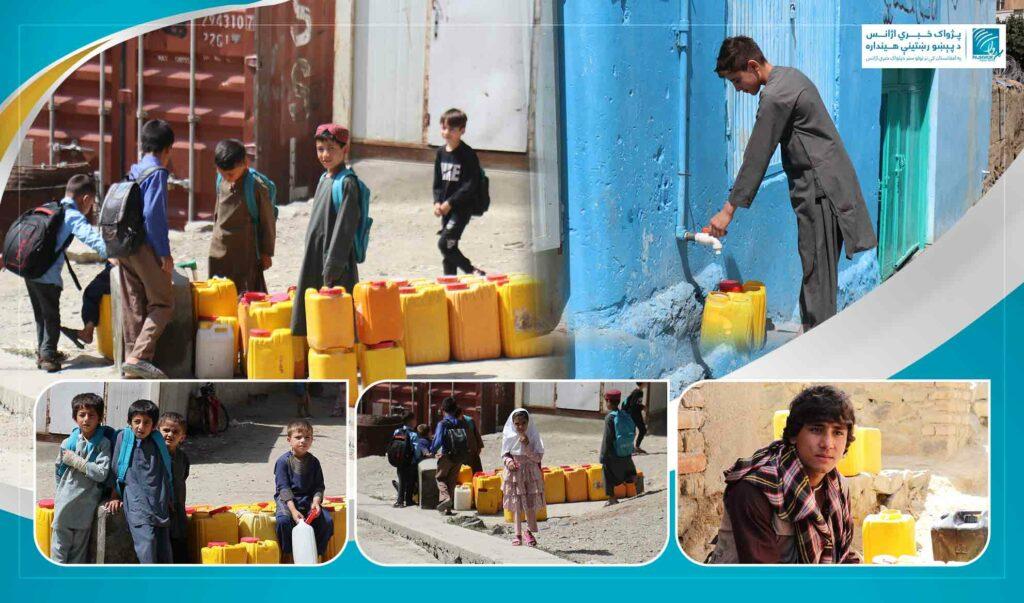KABUL (Pajhwok): The implementation of a water supply project from Panjsher to the capital Kabul would help facilitate two million people, an official said on Thursday.
This comes as some residents of the capital Kabul have complained about the shortage of drinking water.
Qari Matiullah Abid, spokesperson for the Ministry of Energy and Water told Pajhwok Afghan News two million cubic metres of water would be supplied from Panjshir to the capital Kabul and it would meet the water demand of two million people.
He said the survey and design of this project have been completed and sent to the Islamic Emirate of Afghanistan (IEA) leadership for approval.
Qari Abid said this project could address the water shortage issue in capital Kabul to the greater extent and could meet the water demand of around two million people.
He said the problem is not only existed in capital Kabul but people in other areas also suffered from similar issues and the MoEW paid attention to this issue.
He said on the basis of strategy individuals who want to dig deep well should also dig another well for the consumption of extra water.
Eng. Naseer Ahmad Ahmadi, head of the state-owned Urban Water Supply and Sewage Firm, also said that the transfer of water from Panjsher to capital Kabul was a basic project of the IEA.
He added that the design work of this project has been completed by the MoWE, and when the water is transferred to Kabul, the work of network construction and distribution is the responsibility of his department
Some residents in the capital Kabul said they faced shortage of drinking water.
Mohammad Ghorzang, the resident of Chehelsaton area, told Pajhwok Afghan News the water shortage issue in this area was huge and people have to wait in queues to get water.
He said that a well was dug near their house with the financial support of a person from abroad and so far no institution has come from the government to survey this area.
He noted that men, women, boys and young girls come to get water and they face many problems when transporting water to their homes.
Abdul Hameed, the resident of Waselabad area, said there is no life without water and he is also facing problems in this locality due to the shortage of drinking water.
He said: “the time to get water was specific in the past, but now we don’t now we used to come for water in the morning, but now it is not known and people cannot get water at any time.”
He also asked the government to address the water shortage issue.
This comes that the United Nations Office for the Coordination of Humanitarian Affairs (UNOCHA) in Afghanistan said that raising temperatures in Afghanistan caused water shortage issues.
On its x.com UNOCHA said: “Rising temperatures in Afghanistan are worsening water scarcity, 67% of households struggle to access water (up from 48% in 2021). Rural households travel 17 mins on average to fetch water & urban households pay twice as much as in previous years.”
The UN body recently helped nearly 200 households in Dangam district, Kunar, access potable water via a solar-powered water pipe scheme.
On its x.com UNOCHA wrote: “Women & children would walk 4-5 kms to fetch water. Many families left this village as there was no clean drinking water.”
On the other hand, water and environment experts say that the problem of water shortage in some areas of Kabul city has caused people to face an increasing crisis and this problem needs an urgent solution.
Najibullah Sadid, a water and environmental affairs expert, said that that the underground water level in Kabul city has been decreasing since two decades and this decrease is between one and two meters on average in different areas and up to five meters in some areas.
She added that in many areas of Kabul, wells have dried up and people do not have the ability to dig deep wells below 200 meters, and this has caused them to face a critical situation.
In the long term, a lot of work will be done, but the problem of water shortage in Kabul needs an urgent solution, which is the transfer of water through a pipeline from Panjshir sub-district, and this work should be one of the priorities of the caretaker government.
In the long and medium term, it is clear that Kabul needs to implement larger projects, such as the construction of the Shah Tut Dam, which can provide water for 2.2 million people and, feed groundwater.
nh







GET IN TOUCH
NEWSLETTER
SUGGEST A STORY
PAJHWOK MOBILE APP